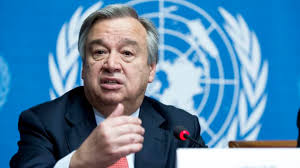The United Nations and the Federal Government along with development partners have launched the 2021 Humanitarian Response Plan for the insurgency-ravaged northeastern part of Nigeria. The Humanitarian Response Plan represents a collective vision for humanitarian action in 2021, and requests US$1 billion to enable partners provide critical services to the 6.4 million most vulnerable people – from a pool of 8.7 million people in need of some form of humanitarian assistance in 2021 in Borno, Yobe and Adamawa states.
According to the UN, a combination of escalating conflict, displacement, and disruption to and loss of livelihoods due to COVID-19 restrictions, could lead to hunger for millions of Nigerians living in the north-east. As many as 5.1 million people are threatened by acute hunger during the upcoming lean season – the worst outlook in four years. The plan, therefore, is based on assessed needs and the realistic capacity of the United Nations and non-governmental organisation partners to implement required actions. Speaking at the event, Minister of Humanitarian Affairs, Disaster Management and Social Development, Hajiya Sadiya Umar Farouq expressed the commitment of the federal government to meeting the needs of the people I’m the affected areas.
She said; “I look forward to a collaborative effort in addressing the plight of the displaced. The federal government remains committed to addressing the plight of the affected people and to ensure safety, security and delivery of life saving assistance to those in need in collaboration with the international humanitarian community. “The requirements for this 2021 Humanitarian Response Plan reflect a growing need, while we know that the available resources will very likely not be commensurate with those needs. We are facing additional challenges in terms of security and access for humanitarian partners, which is why we have developed the National Humanitarian Development Peace Framework”, she added. United Nations Resident/Humanitarian Coordinator, Edward Kallon on his part urged the federal government to seek quicker ways of ending the insurgency, saying the solution to humanitarian crisis is not a humanitarian response, but peace.
He said due to the protracted nature of the insurgency in the Northeast, there was need for stakeholders to review their strategies to support durable efforts in resolving the crisis. Kallon said; “Ongoing conflict continues to be the main driver of humanitarian needs in northeast Nigeria, where millions of people have been displaced. Longstanding insecurity and violence, compounded by climate change, and the impact of Covid-19 are increasing the vulnerability of close to nine million people. Close to two million people are internally displaced, while millions of people depend on humanitarian partners for basic services, and up to 5.1 million people are facing hunger in the lean season – the worst outlook in four years. He Said humanitarian assistance is greater challenges by the COVID-19 pandemic especially in donor countries, as well as restrictions caused by the need to manage the pandemic even in IDP camps.
“The humanitarian crisis in Borno, Adamawa, and Yobe states, unfortunately, remains one of the largest in the world and continues to have a profound impact on Nigeria and its people, causing untold suffering and deprivation for millions of vulnerable women, men and children. The year 2021 marks the twelfth year of the conflict and the sixth year of the international community working together with the Government of Nigeria to provide humanitarian support. Last year was a challenging year for vulnerable people in north-east Nigeria. It was a year marked by a new reality, the COVID-19 pandemic. The socio-economic impact of the pandemic has already diminished the resilience of millions of people, increasing the fragility of those who were already extremely vulnerable,” he added.
According to him, the main thrust of the operation in 2021 will continue to be providing lifesaving and life-sustaining support to people who are displaced, host communities, and others who are affected by the humanitarian crisis. “This includes improving the living conditions in camps through decongestion and enhancing the quality of services. We will continue to prioritise prevention, development where feasible and humanitarian assistance where needed. A durable framework to find solution to the crisis in north east Nigeria must promote and implement the humanitarian, development and peace nexus. There are no humanitarian solutions to humanitarian problems. The only solution to the problem in Northeast Nigeria is peace and I have told stakeholders that we must prioritise prevention, development and humanitarian assistance. I have never seen a conflict that has been resolved by the barrel of the gun”, Kallon added.
Country Director for International Rescue Committee IRC, Tunde Ojei who spoke on behalf of International Non-Governmental Organisations INGOs working in the Northeast urged the federal government not to relocate displaced persons without tangible protection and support system.
A representative of national Non-Governmental Organisations NGOs operating in the Northeast decried attacks on humanitarian workers which she said would force more of such workers to leave the areas greatly impacted by the Insurgency. She called for the implementation of the “localisation agenda” to allow for the use of local NGOs who are on ground and live in some of those communities. In 2020, only 55 per cent of the required funding for the Humanitarian Response Plan was secured notwithstanding the additional needs created by the COVID-19 pandemic, recording the lowest funding level since the beginning of the joint response.

